How many times can the same stories be retold? Comparable to the enduring adage that nothing new exists under the sun, countless coming-of-age films continually fail to gaze beyond their illusion of self-importance and resultingly spiral into rehashing the same accounts, an epidemic that proves the subgenre needs to either revitalize itself or die out for good. To be fair, Eric Steel’s debut feature “Minyan” lacks any elements that would rank as irredeemable or offensive, but the filmmaker’s introduction into the world of fictional filmmaking, regrettably, fails to impress.
READ MORE: 12 Most Anticipated Films Of The 2020 Berlin International Film Festival
Cut to New York City in the late-’80s. Winter air cuts through brick buildings as the fever of teenage revolt infects the landscape. As a gay, Jewish immigrant, David (Samuel H. Levine) is a confused young man caught in the throes of a pre-life crisis. Questioning the existence of God is never a simple task, but puzzling over this theological doubt while also attempting to cloak your sexuality from your family proves to be a task that kick-starts David’s journey, a venture filled with worn-out cliché and missed opportunities.
Commenting on a film that flounders its potential is never pleasant, but what makes “Minyan” so frustrating is the realization that Steel’s film could have easily shaken up the coming-of-age status quo. The director, who previously helmed the documentary “The Bridge” and worked as a producer on Martin Scorsese’s “Bringing Out the Dead,” proves that he’s acquainted with the crucial necessities of storytelling, particularly ambiance and ambiguity, elements emboldened by Ole Bratt Birkeland’s naturalistic, stately cinematography.
Likewise, Levine’s portrayal of David ensures that the actor is a talent to keep an eye on; the performance irradiates with a simmering ferocity barely contained beneath the surface. Furthermore, the subplot of Itsak and Herschel (Mark Margolis and Christopher McCann)—the elderly, closeted gay men who live next door to David’s grandfather (Ron Rifkin delivers a commendable performance)—provides an emotionally resonant undercurrent to the film’s main focus, a tact that unearths the clumsy fragility of its core storyline.
Apart from the abovementioned compliments, “Minyan” cannot earn much more than a participation trophy. The meandering narrative flow leapfrogs without any sense of rhythm, almost as if the collection of scenes was augmented by a haywire randomizer. Similarly, “Minyan” embodies a sentiment of egotism, a falsely held confidence that believes a noteworthy trace of emotive resonance actually exists within the parameters of its near-two-hour runtime, which could—easily—be shaved by 30 minutes.
Similar to its contemporaries, “Minyan” ensures it adheres to the outdated laundry list of scenes existent in the vast majority of coming-of-age flicks: the neon-hued dance club sequence, the “realistic” first sexual encounter, the rejection by the protagonist’s older, indifferent crush—they’re all here, wholly lacking the much-needed subversion, inventive style, or potent fervor that would warrant their inclusion. Moreover, alienation, assimilation, and the shifting influence of religion in the West might rank among the ideas that “Minyan” seeks to speak to, but the film never pierces beneath the skin. Not even once.
Movies should not be required to reinvent the medium, but those that neglect to incorporate any fresh ingredients to the recipe whatsoever rarely deserve any worthwhile comments above the recognition of the effort put forth by the artists involved. Taking this into account, applying any slander to Steel’s film would be unwarranted, but denying the reality that “Minyan” is underdeveloped and unrefined would be a lie. [D+]
Click here for our full coverage of the 2020 Berlin International Film Festival.





